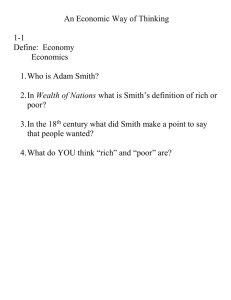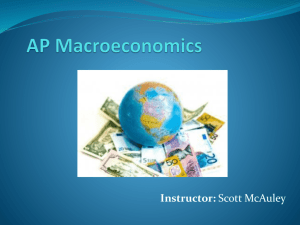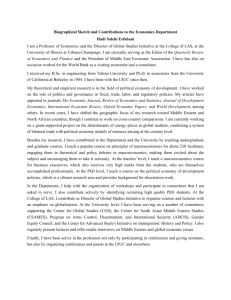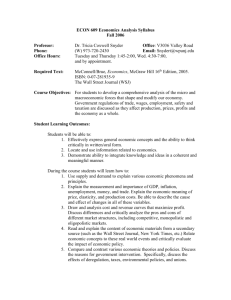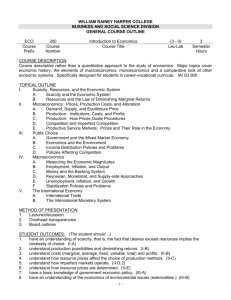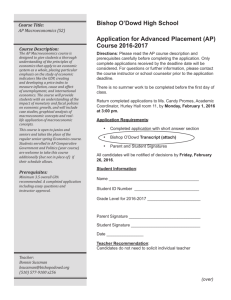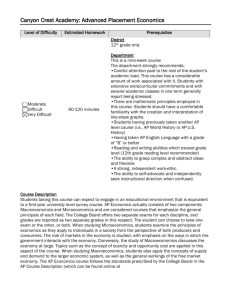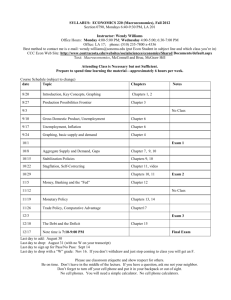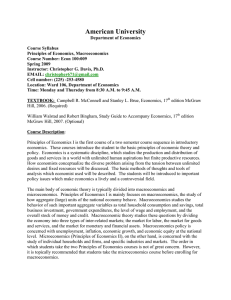MACROECONOMICS AP
advertisement
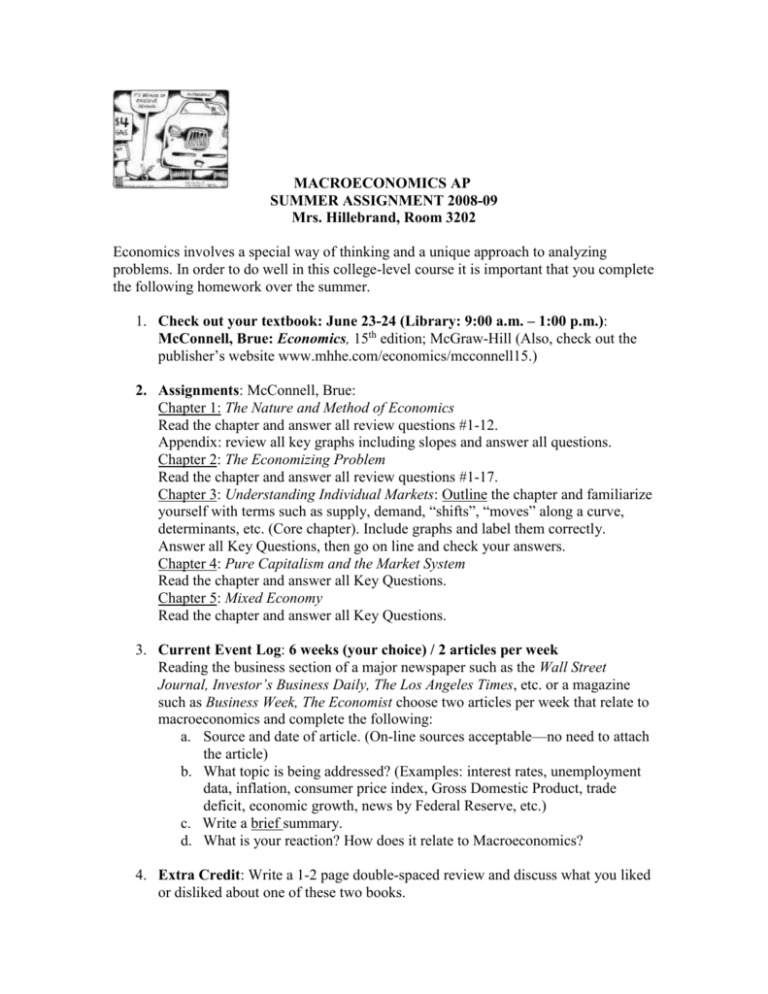
MACROECONOMICS AP SUMMER ASSIGNMENT 2008-09 Mrs. Hillebrand, Room 3202 Economics involves a special way of thinking and a unique approach to analyzing problems. In order to do well in this college-level course it is important that you complete the following homework over the summer. 1. Check out your textbook: June 23-24 (Library: 9:00 a.m. – 1:00 p.m.): McConnell, Brue: Economics, 15th edition; McGraw-Hill (Also, check out the publisher’s website www.mhhe.com/economics/mcconnell15.) 2. Assignments: McConnell, Brue: Chapter 1: The Nature and Method of Economics Read the chapter and answer all review questions #1-12. Appendix: review all key graphs including slopes and answer all questions. Chapter 2: The Economizing Problem Read the chapter and answer all review questions #1-17. Chapter 3: Understanding Individual Markets: Outline the chapter and familiarize yourself with terms such as supply, demand, “shifts”, “moves” along a curve, determinants, etc. (Core chapter). Include graphs and label them correctly. Answer all Key Questions, then go on line and check your answers. Chapter 4: Pure Capitalism and the Market System Read the chapter and answer all Key Questions. Chapter 5: Mixed Economy Read the chapter and answer all Key Questions. 3. Current Event Log: 6 weeks (your choice) / 2 articles per week Reading the business section of a major newspaper such as the Wall Street Journal, Investor’s Business Daily, The Los Angeles Times, etc. or a magazine such as Business Week, The Economist choose two articles per week that relate to macroeconomics and complete the following: a. Source and date of article. (On-line sources acceptable—no need to attach the article) b. What topic is being addressed? (Examples: interest rates, unemployment data, inflation, consumer price index, Gross Domestic Product, trade deficit, economic growth, news by Federal Reserve, etc.) c. Write a brief summary. d. What is your reaction? How does it relate to Macroeconomics? 4. Extra Credit: Write a 1-2 page double-spaced review and discuss what you liked or disliked about one of these two books. Todd G. Buchholz: New Ideas from Dead Economists, 1999 (!) edition. This amusing book provides an overview of economic thought. Robert L. Heilbroner: The Worldly Philosophers. 5. Organize assignments in a clear folder and create a table of contents. 6. Other suggested summer readings: You might like reading more about economic issues in the following books: Robert, J. Barro: Nothing Is Sacred: Economic Ideas for the New Millennium; Cambridge, Mass: MIT Press, 2002 (In this collection of essays, economist Robert Barro offers his views about economists, the economy, and the proper scope of public policy.) Alan S. Blinder and Janet L. Yellen: The Fabulous Decade: Macroeconomic Lessons from the 1990s; Twentieth Century Fund, 2001 (Two economic advisers to President Bill Clinton look back at a prosperous decade for the U.S. economy.) Paul Krugman: Peddling Porsperity; New York: Norton, 1994 (This book examines the evolution of economic ideas and economic policy, with an emphasis on macroeconomics and international trade.) Steven E. Landsburg: The Armchair Economist: Economics and Everyday Life; New York: The Free Press, 1993 (Why does popcorn cost so much at movie theaters? Puzzles of economics and quite engaging.) Burton G. Malkies: A Random Walk down Wall Street; New York: Norton, 1973, revised 2000 (introduction to stocks, bonds, and financial economics is not a “get rich quick” book, but it might help you get rich slowly.) Russell Roberts: The Invisible Heart; Cambridge, Mass.: MIT Press 2001 (A romance novel based on the principles of economics.) 7. If you would like to get in touch with me over the summer contact me at: margithillebrand@aol.com.


